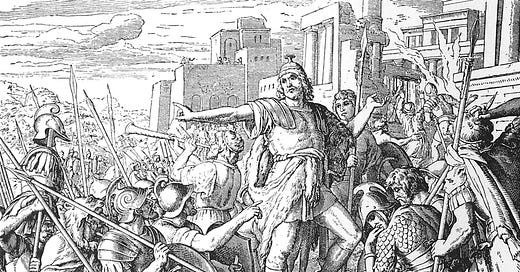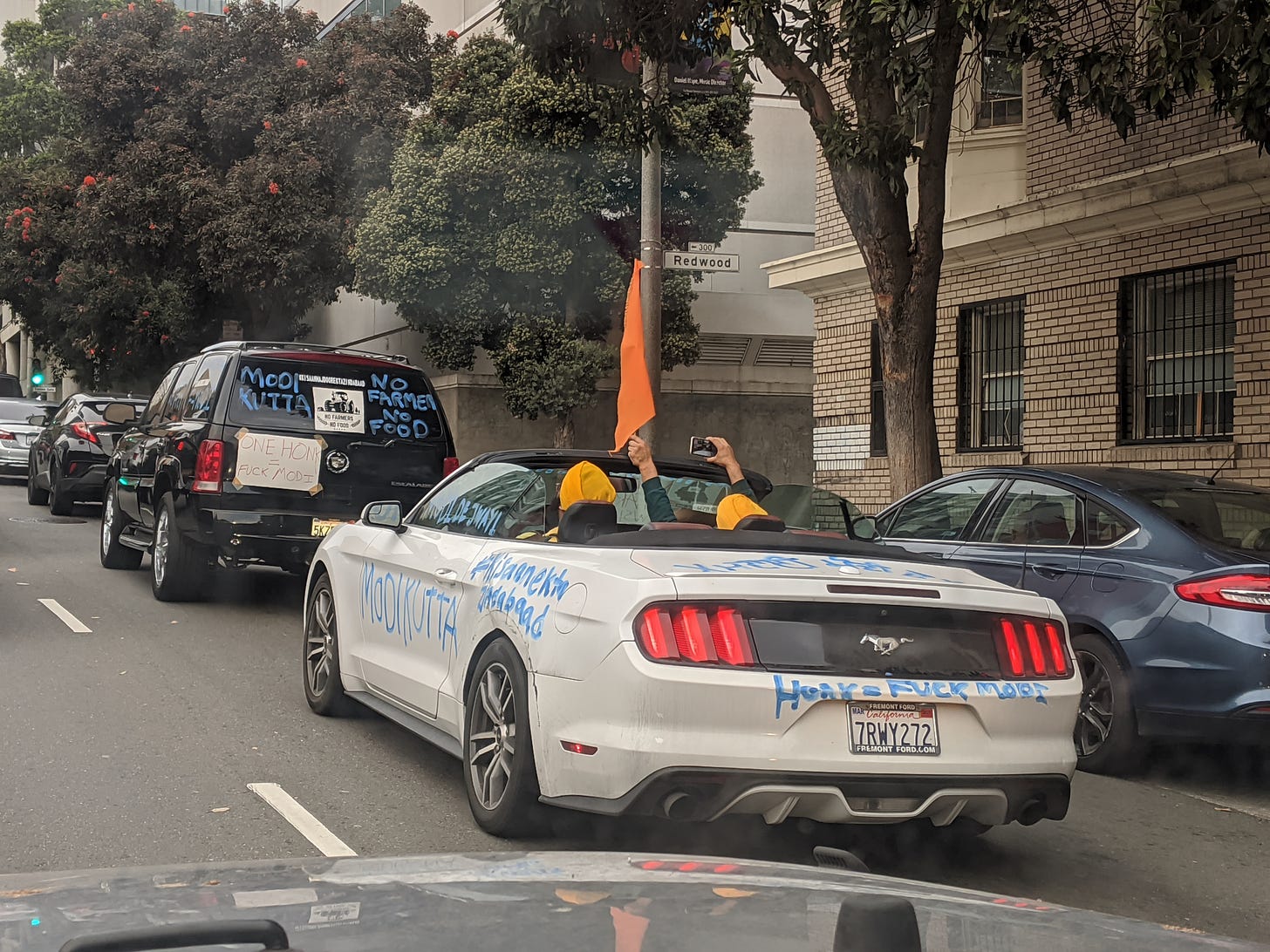
"Even if all the nations that live under the rule of the king obey him, and have chosen to obey his commandments, everyone of them abandoning the religion of their ancestors, I and my sons and my brothers will continue to live by the covenant of our ancestors.”
-1 Maccabees 2:19
There’s an aphorism in linguistics that says “a language is just a dialect with an army and navy”.
Similarly, the American liberal mainstream is just a cultural bubble with a The New York Times and Harvard University.
If you’re incredulous, consider the fish-in-water aspect of culture (particularly one that seems to stretch infinitely to the horizon, as American culture does) plus our endless ability to reassure ourselves we live in the navel of the world (a presumption held by almost every culture from hunter-gatherers to our technological one).
We all live in cultural ponds, some are just so large that, like the Great Lakes, they might be mistaken for an ocean when you’re bobbing in the middle of it. The only people who know the pond for what it is are those whose minds have known other waters, ones where indeed the coastline is always in view and your boat quickly runs aground if you go too long in one direction.
Why all the nautically-themed reflection on culture?
Tomorrow begins the festival of Hanukkah, which commemorates the Maccaebean Revolt against the Seleucid Empire, and the restoration of Jewish worship at the Second Temple in 165 BC. While one reading of the story has the Jews rebelling against a foreign power, another interpretation of the story (which is also historical) is that the conflict was really an internecine civil war between zealots and assimilationists who were happy to melt Jewish identity into the preponderant Hellenic culture of the time.
An aside to my secular readers: Yes, this is all getting a bit religious and Jewy. Maybe you came here for tech commentary and you’ve got Biblical revolts on your plate, and wondering what’s going on. Without rabbit-holing in the topic too much (and maybe leaving that for yet another post), I’ll say this: While most of your exposure to religion might come from the Is the Big Man in the Sky Real? debate that characterizes religious discourse in our secular media, e.g. the New Atheists, Hitchens and Dawkins, etc., religion is really just a narrative and moral framework with which to discuss reality (at least flavors like Judaism and Catholicism).
To the extent such religions are universal, the stories in play are applicable to any number of modern conundra (such as the one around tolerating differences in a liberal democracy, which we’ll get to shortly). Thus the Maccabees and the Hanukkah story are just a narrative short-form for saying ‘the violent hard-asses who preferred to die than give up their tradition vs. those who went with the flow and thought them a bunch of crazies’. The challenges and questions we face aren’t so different than Second Century BC Judea (even if the stakes are lower), which gives us a pleasing continuity with generations past (and perhaps a bit of insight too, since we can approach the Maccabees with a level of remove we can’t muster for ourselves).
You might argue: What’s the point of cultural touchstones like Judaism or Christianity, if you’ve got to preface every essay with a remedial summary of the symbols? True that. We’re quickly becoming a culture where there are no common symbols or stories underlying discourse, even among educated elites (at least beyond Netflix shows). But that also is a question for another post.
And so does Hanukkah live on long after the Seleucids are literal ancient history, as an internecine conflict around assimilation. Just today The Times published a thoughtful rumination on the slow generational death of religious connection, the writer settling into the ‘Nones’ category that now characterizes roughly two-thirds of Americans. The Times has a bit of a Hanukkah hang-up, often publishing takes from lapsed or close-to-lapsed Jews about their struggles with the holiday.
One last religious primer: Hanukkah, despite being about the only Jewish holiday seen publicly in the US, isn’t even one of the official High Holidays. In that way that Judaism gets rapidly localized—introductory books for Jewish converts have multiple sections per holiday describing how this or that Jewish sub-variant celebrates—American Jews elevated what’s a relatively minor holiday into a bulwark against Christmas due to calendrical coincidence. They invented the whole gift-giving thing (no gifts are involved elsewhere in the Jewish world) as a counterweight to ward off that implacable cultural tyrant, Santa Claus and his gentile elves. So Hanukkah is doubly symbolic: It’s a tale about assimilation celebrated as an exercise against assimilation, in the name of resisting the Santa Industrial Complex. For many American Jews, Hanukkah is their last link with a Jewish childhood that attempted to define them as something outside the cultural default. Which is why The Times can’t shut up about it.
But the issue is much bigger than a repurposed Jewish holiday.
One of the many new axes along which the current political discourse can be projected is around cosmopolitanism vs. localism. The anti-free trade rhetoric of Trump, or the anti-EU rhetoric of Brexit, was a re-orientation of the political universe around issues of universalism vs. nationalism instead of mere left and right. Much of the populist right, both in the US and abroad, now exists mainly in nominal opposition to that globalist Times-reading Davoisie.
What good contemporary liberals want is a wonderfully diverse world of many colors and faiths, all expressing New York Times opinions while living Whole Foods lifestyles. Real cosmopolitanism though is being able to live, work, and speak in radically different cultures—cultures whose values would in fact clash if forced into contact—without any discomfort whatsoever. The avowed urban cosmopolitans, so versed in the elite-speak of diversity, if parachuted into (say) Latin America and forced to deal, would be be largely incapable of doing so. Can you imagine a Swarthmore grad springing ‘LatinX’ in bad Spanish on a Buenos Aires cab driver? This supposed elite cosmopolitanism is actually a form of parochialism, even if currently a preponderant one.
This is no great ding on American elites—the Romans didn’t seem particularly clued into Gallic culture either—but the Romans didn’t think themselves the apex of tolerance and acceptance either. The Times-reading class exists in an odd paradox: nominally open to every culture and worldview known to man, but never or rarely encountering any (as equals at least). It’s easy to maintain a certain flou tolerance if it means never having to actually reconcile values and public policies with people who think radically different than you do. For the record, I’m too am super into Venusian culture too—my best friend is a Venusian—so long as those aliens keep it on Venus rather than bring it here on Earth.
But let’s stop looking at the Hanukkah story from the Greek perspective: the compelling question is what do the Jews in the story should do. And by ‘Jew’ I mean every immigrant tribe in the US that finds itself faced with the assimilation question.
Take this cultural nugget as a particularly on-the-nose anecdote: Cuban exiles of my parents’ generation regularly toasted with the phrase ‘next year in Havana’, as the Jews do about Jerusalem on Passover. My parents insisted I attend the Jesuit school that was a reboot of the same school in pre-revolutionary Cuba, which taught an entire Cuban high school program alongside the American one, indulging the farfetched fantasy that we’d all return the moment Castro died. If I speak textbook Spanish now, per the lofty dictates of La Real Academia, and know that the Guadalquivir is the only navigable river in Spain, it’s thanks to the endless drilling of the Jesuit fathers in the service of anti-assimilationist zealotry. We were to be American by historical necessity but Cuban by birth and culture, and the identity was to be latent and ready to be deployed when the great return to the homeland was possible. In the meantime, we’d adapt to the Anglo world and be as American as anyone, but there was always a second identity with a second language, name, set of values and shared history¹.
Recently, and totally randomly, I was jolted back into the Miami world I thought I’d left behind. The alumni relations person of that self-same Jesuit school (and a high school classmate) found me online and included me in our class’ WhatsApp group. The content and banter there would get you banished from polite Whole Foods society instantly. From the election-day chatter, I reckon something like 60% of the members voted for Trump (around what the Cuban vote was in Miami). I hadn’t talked to these people in over 20 years, and many have gone on to prominent careers in respectable Miami society, but it’s as if nothing has changed. As a warning to high school students everywhere, all the high school monikers stuck: “Beef”, “Magoo”, and several more I can’t quote here without losing my Neoliberal membership card were still in affectionate usage² .
So what would the Greeks of our day say about these weakly-Hellenized Jews who don’t make offerings to the right gods in the Temple, and who insist on retaining their backward, unfashionable beliefs? It’s an academic question for the members of the group still in the Miami cultural carveout, but less of one for members like me who live among the Greeks and make frequent visits to their temples.
Fortunately the genius of the American political experiment comes to the rescue: in a truly liberal democracy, the constitution serves as a common armature around which (actually) diverse constituencies cohabit a common polity. Beyond the demands of democracy and civility, I don’t need to genuflect before the idols of the current Greek elites, and Jews need not despoil their temple with false idols (i.e., my WhatsApp group can continue to exist without policing by ‘gringa’ Karens and the LatinX Patrol).
Also recently, also randomly, I was again reminded of the odd choice the unapologetic American minority faces in America. Driving north on Franklin Street in San Francisco, I suddenly found myself in a noisy caravan protest. Squinting at the lettering, it seemed to involve farming and Indian PM Nahendra Modi. I tweeted about it and Indians chimed in to try and explain, some complaining the protest shut down traffic on the Bay Bridge. I still don’t totally understand the actual issue, but the reflex is intensely familiar: Cubans in Miami would shut down bridges and highways over some burning exile issue as well. To me, it’s the most American thing ever, and the fact a big honking Escalade and Mustang were festooned with phrases that 99% of Americans couldn’t understand makes it even better. Here is a community fully living both their American and non-American identities, with little concern for what the reigning elites consider proper Greek behavior (not that they’d be able to understand any of this anyhow, as I couldn’t). This is real cosmopolitanism, not the fake Whole Foods kind that sees everyone as a character in some ethnic morality play performed in endless loop, with secular Anglo whites (imagine that) as the central reference point against which every group is defined.
The Hanukkah lesson for Jews and non-Jews alike is this: while living as a minority inside some larger imperial construct, nobody will maintain that culture’s real vitality other than the members themselves. Our nominally tolerant liberal society might flatter this or that group with attention or a newly-coined name, but ultimately assimilation into that greater whole is the path to cultural oblivion. If the ‘Jerusalem’ of next year doesn’t appear, the best you can do is negotiate a new hybrid identity, as Jews themselves did during almost 2,000 years of diaspora life. But that requires maintaining that separate and independent identity, generation after long generation.
If that greater whole should suddenly find your identity problematic, or if members of your own tribe should advocate embracing the roles assigned by the powers that be, then the choice becomes stark and existential. We now have a Hanukkah question to ponder precisely because the Maccabees—and Esther and Ruth and so many others—acted as they did. History doesn’t record the names of assimilationists or grant them holidays: they’re simply forgotten as they themselves chose to forget.
Instead the exiles built a new homeland in Miami, never to return, aliyah in the Cuban context being rather less attractive than the Israeli one. But the ‘Havana’ of the nostalgic Miami toasts, as perhaps with the Jewish ones, were about the soul’s longing for a lost and unrealized ideal, never mind that you can now step on a plane to Havana or a Jewish Jerusalem.
A grown-ass man with a wife, kids, a mortgage and a career, but he’s “Beef” to us. If, God forbid, some tragedy were to strike, the post would be “Man, it’s so sad what happened to Beef”. From schoolroom to the grave: “Beef”. Some identities you just can’t outlive. Fortunately, I’m only stuck with “Tony” (the Anglo abbreviation having made the hop into the Spanish-speaking world).












This might be obliquely pertinent. As a science copy editor and blogger, I once pondered a study of a lizard species that had three male "morphs"—with blue, green, and red throats—signaling different reproductive strategies. There were dominant males, cooperator males—who got access to females by being the dominant male's best buddy/sidekick—and "sneaker" males, who got access to females when the dominant's back was turned. Stick with me, this does become relevant, more so even than the obvious comic human analogies (the "sneaker" male is the cartoon guy in the bed with the wife when the husband unexpectedly comes home).
A balance among these "morphs," rather than a more than fleeting preponderance of any one of them, seems to serve the species. I was provoked to the following speculation.
"Societies need cohesion and change in some kind of balance; at one end of the scale lurks the danger of stagnation, at the other, disintegration....It’s easy to imagine, though probably impossible to prove (and here irresponsible bloggers have a carte blanche not granted to scientists), that humans come in ... three social morphs: call them tribal, trader, and...tech geek. “Tribals” would have very strong [preference] for “their own kind.” “Traders,” lacking those strong birds-of-a-feather cohesion drives, would be free and even impelled to cross boundaries in search of novelty and fortune—at higher risk (the guy in the pith helmet in the cartoon cannibals’ pot is definitely a Trader), but sometimes for a higher payoff [including hybrid vigor]. Tech nerds, more focused on ideas and things than on people, would just want to be left alone to tinker and invent. Ring any bells? Our ever more global world is dominated by Traders—only thanks to the tech nerds—but the recoil of horrified Tribals poses a genuine danger (and, perhaps, [necessary] counterbalance) to the Traders having their way."
In other words, maybe assimilationists aren't the bad guys you portray them as, and nationalist populists aren't the bad guys assimilationists portray them as. They're just different. in our current Tech Nerd–enabled tug-of-war between Tribals and Traders, maybe neither is wrong, and both are necessary.
Very insightful and fun read, thanks! I look forward to your next effort.